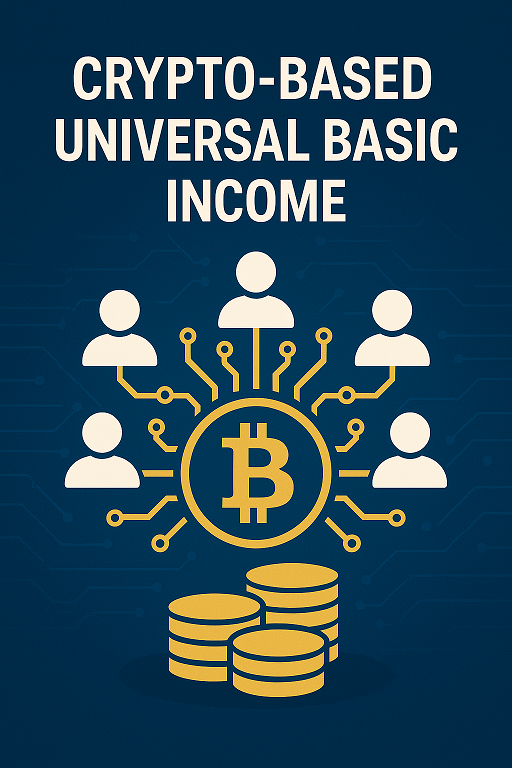Crypto-Based Universal Basic Income is emerging as one of the most intriguing concepts in the intersection of technology, economics, and social equity. At its core, it combines the power of blockchain technology with the promise of providing financial security to all, regardless of employment status. But how does it work, and can it truly revolutionize global welfare systems?
Understanding Universal Basic Income (UBI)
Universal Basic Income (UBI) is a socio-economic policy that involves providing regular, unconditional payments to every individual in a society. The goal is to reduce poverty, close income gaps, and offer financial stability in a rapidly changing labor market. Historically, UBI has been met with both enthusiasm and skepticism. Critics question its sustainability, while proponents argue it could empower individuals and stimulate economic growth.
In recent years, the rise of decentralized technologies has inspired a modern twist: Crypto-Based Universal Basic Income. This approach seeks to deliver UBI through cryptocurrency platforms, making use of blockchain’s transparency, efficiency, and global reach.
Why Blockchain and Crypto Make Sense for UBI
The biggest hurdle for traditional UBI systems is implementation—tracking, distributing, and verifying payments at scale. Government-run programs often require substantial administrative infrastructure. Cryptocurrency, however, introduces the potential for automated, borderless, and auditable distributions.
Key Benefits of Using Crypto for UBI:
- Global Access: Digital wallets powered by crypto provide a gateway for individuals—especially the unbanked—to engage in digital finance.
- Low Transaction Costs: Unlike traditional banking systems, crypto transactions can be executed with minimal fees.
- Transparency and Trust: Blockchain records are immutable, ensuring a public ledger of all UBI payments.
- Smart Contracts: Automating the distribution process without needing centralized control.
Projects like GoodDollar, Circles, and Proof of Humanity have already started to experiment with these models. While small in scale, they represent a potential shift in how basic income can be delivered across borders.
Case Study: GoodDollar and the Crypto-Based Universal Basic Income Experiment
Launched in 2020, GoodDollar is a nonprofit project backed by eToro founder Yoni Assia. The platform distributes a daily amount of its native token ($G$) to users worldwide. The concept relies on a yield-generating pool funded by crypto investors. Interest generated from these funds is then distributed as a basic income.
What sets GoodDollar apart is its emphasis on financial education and accessibility. Users from over 180 countries have signed up, and many use their daily $G$ to purchase goods or services in local communities.
This showcases a real-world application of a Crypto-Based Universal Basic Income system functioning with minimal bureaucracy.
Could This Replace Traditional Welfare?
While it’s too early to claim that crypto-based income can replace existing welfare systems, it can certainly complement or enhance them. Governments, NGOs, and international institutions are closely monitoring these initiatives.
One possibility is hybrid systems: government-backed UBI programs distributed via national digital currencies or decentralized tokens. This could dramatically reduce fraud and administrative costs while increasing reach and efficiency.
Economic and Social Implications
The potential impact of a Crypto-Based Universal Basic Income on the global economy is enormous. By redistributing wealth through decentralized protocols, it could address issues like:
- Automation-driven job loss: As AI and robotics continue to displace traditional jobs, a base income could cushion the blow.
- Inequality: With the rich-poor gap widening, this model can empower underserved populations.
- Financial Inclusion: Crypto wallets and tools serve as digital on-ramps, enabling more people to join and benefit from the global economy.
Additionally, people might be encouraged to pursue creative, entrepreneurial, or caregiving roles that are often undervalued in today’s economy.
Challenges of Implementing a Crypto-Based Universal Basic Income
Despite its promise, this model isn’t without obstacles:
- Volatility: Cryptocurrencies are known for their price swings, which can affect purchasing power.
- Regulatory Uncertainty: Many governments are still navigating how to regulate digital assets.
- Adoption Barriers: Lack of education, internet access, and trust can hinder growth in less-developed areas.
- Scalability: Blockchain networks often struggle with transaction speeds and congestion.
These challenges must be addressed before mass adoption can occur.
Ethical Considerations and Identity Verification
One pressing issue is ensuring that each participant is a unique, real individual. Without proper safeguards, UBI systems could be gamed by bots or fake identities.
New identity systems based on decentralized protocols and secure biometric methods are being proposed as promising tools to ensure fairness and accuracy.
However, this opens up questions about privacy, surveillance, and data ownership. A delicate balance must be struck between verification and individual rights.
Community-Led and Grassroots Movements
Beyond technology, one of the strongest arguments for a Crypto-Based Universal Basic Income is its ability to empower communities. Instead of waiting for government intervention, grassroots groups can launch their own economic ecosystems.
A local community could create its own token, tie it to local services, and use it to support residents through mutual aid. These tokens could incentivize participation in community projects, environmental cleanups, education, and more.
This bottom-up approach aligns with the original ethos of blockchain: decentralization, autonomy, and trustless collaboration.
Funding Models for Crypto-Based Universal Basic Income
Funding remains a key question. Traditional UBI needs tax revenue or sovereign funds. In the crypto world, several models are being tested:
- Staking Rewards: Like GoodDollar, using DeFi protocols to generate yield.
- Token Inflation: Minting new tokens regularly, though this risks devaluation.
- NFT-based revenue sharing: Allocating a share of secondary market royalties toward funding a universal basic income treasury.
- DAO Contributions: Community-led DAOs (Decentralized Autonomous Organizations) can allocate part of their treasury.
The beauty of this space is experimentation. Unlike bureaucratic organizations that often move slowly, blockchain-based initiatives can pivot and innovate with remarkable speed.
Will Governments Join the Movement of Universal Basic Income?
Although most crypto UBI projects are independent, some governments have begun exploring national digital currencies (CBDCs). If a government chooses to distribute a portion of its CBDC via UBI mechanisms, it could merge the best of both worlds.
For now, geopolitical caution prevails. Governments are wary of crypto’s anonymity and its potential to bypass monetary policy. But as pressure mounts to find innovative welfare solutions, collaboration may become inevitable.
Philosophical Questions: Work, Value, and Identity
UBI challenges traditional beliefs about work and value. If people are paid regardless of productivity, will they still contribute meaningfully to society?
Early pilot studies say yes. When freed from survival pressures, individuals are more likely to engage in meaningful work, education, or caregiving.
A Crypto-Based Universal Basic Income adds another layer: participation in decentralized networks can itself be a form of contribution. Whether by validating transactions, voting in DAOs, or promoting adoption, people play roles in sustaining the system.
The Road Ahead: What Needs to Happen
To transition from concept to reality, several developments are necessary:
- Stablecoins and Volatility Management: UBI tokens must hold value over time.
- Robust Identity Frameworks: Verifying unique users without violating privacy.
- Global Standards and Interoperability: So different systems can talk to each other.
- Education and Literacy: Teaching people how to use wallets, keys, and tokens.
- Policy Innovation: Governments need to consider regulatory sandboxes for crypto UBI pilots.
With AI advancing rapidly and labor dynamics shifting, the urgency for solutions like these is growing.
Final Thoughts of Universal Basic Income
The dream of a Crypto-Based Universal Basic Income is far from utopian fantasy. It’s an evolving reality powered by community, innovation, and decentralized technology. While hurdles remain, the foundations are being laid today.
This approach doesn’t just offer income—it offers autonomy, dignity, and inclusion. In a world where financial systems are often exclusionary, crypto-based UBI provides a fresh vision of equity, enabled by code rather than bureaucracy.
Whether it becomes the dominant model or a complementary system, it’s clear that crypto and UBI are on a converging path. The question isn’t if this model will expand—but how and when.


















